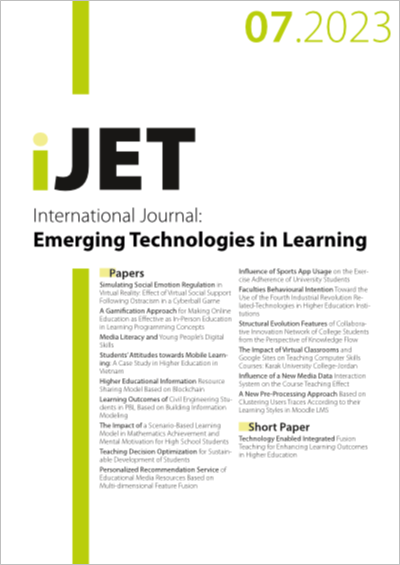Simulating Social Emotion Regulation in Virtual Reality
Effect of Virtual Social Support Following Ostracism in a Cyberball Game
DOI:
https://doi.org/10.3991/ijet.v18i07.29419Keywords:
Virtual reality, Social emotion regulation, Social support, Agent, Social exclusionAbstract
Virtual reality (VR) is a valuable research tool offering advantages in terms of high experimenter control and standardization in the simulation of vivid personal and social experiences. It has been used for assessments and training in social cognition with the use of virtual agents instead of face-to-face interactions – but its potential for the study of social emotion regulation has, perhaps surprisingly, largely remained untapped. The present study evaluates a novel immersive VR scenario designed to study the efficacy of social support by a virtual agent using a modified version of Cyberball, an established paradigm to induce the feeling of ostracism. Participants embodied a new pupil in a virtual school environment and played Cyberball, after which they either did or did not receive emotional support. Self-reports and psychophysiological markers demonstrated that the negative impact of social exclusion in Cyberball was successfully replicated, while participants also reported a significant improvement in emotional state after being supported by the virtual agent. These results indicate the potential of the developed scenario for research on social emotion regulation in immersive VR. Future studies could aim to test the efficacy of social support for people with difficulties in self-regulation, for example individuals with high social anxiety, with a view to developing training programs in VR.
Downloads
Published
How to Cite
Issue
Section
License
Copyright (c) 2023 Lina Stallmann, Michel Tran, David Rudrauf, Daniel Dukes, Andrea Christiane Samson

This work is licensed under a Creative Commons Attribution 4.0 International License.


